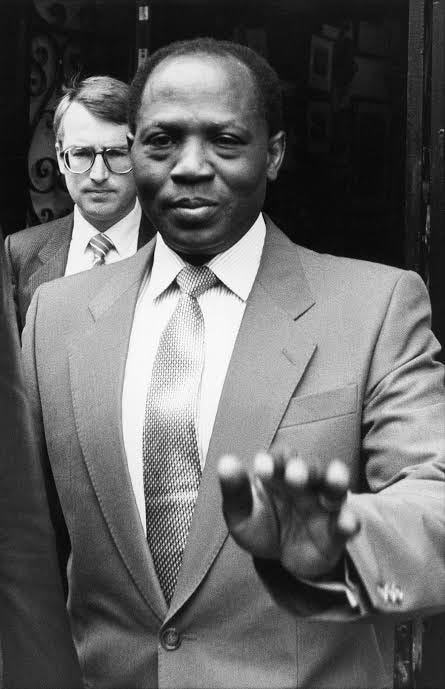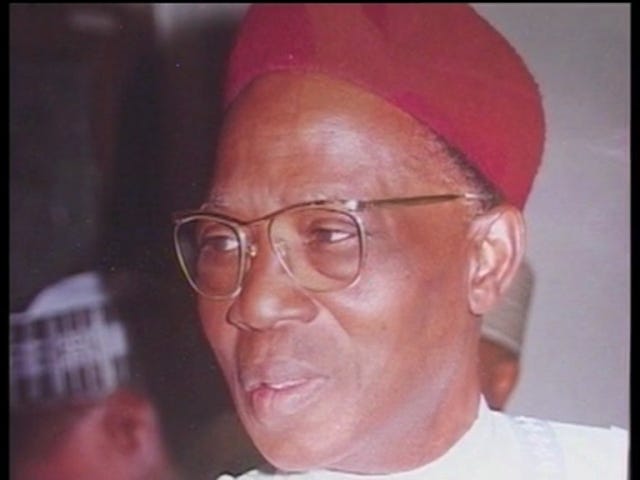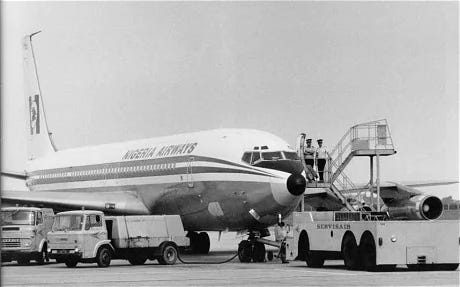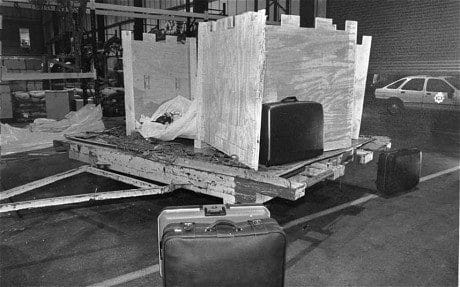Umaru Dikko, Nnamdi Kanu and Buhari's Tough Love For Fugitives
Rehashing the "Dikko affair" and its striking similarity with the 'extraordinary rendition' of Nnamdi Kanu
Highlights
December 31, 1983
“The Country's Most Wanted Man”
Dikko In London
NSO + Mossad = Kidnap
Kanu's ‘Extraordinary Rendition’
Footnotes
December 31, 1983
I and my colleagues in the Armed Forces have, in the discharge of our national role as promoters and protectors of our national interest, decided to effect a change in the leadership of the government of the Federal Republic of Nigeria and form a Federal Military Government. This task has just been completed…Accordingly, Alhaji Shehu Usman Shagari1 ceases forthwith to be the President and Commander-in-Chief of the Armed Forces of Nigeria.
Those were not ordinary words. They came straight from the larynx of Brigadier Sani Abacha, then commander of the 9th Mechanised Brigade in Ikeja, Lagos. The Brigadier had, at 7 am on December 31, 1983, brusquely interrupting TV and radio programming across Nigeria, declared that President Shehu Shagari had been overthrown in a coup d’état that happened overnight.2
But if the coup happened in one night, it was a product of many stoic nights.
In fact, in this case, the mellifluous words of Grammy award winner Burna boy in the song “Omo” are most relevant. There, the singer put all his cards on the table and declared rather honestly, “…girl, I've been scheming, plotting, planning…”. Indeed, the Nigerian military hierarchy had also been scheming, plotting and planning, ever since Shehu Usman Aliyu Shagari was sworn in as the first democratically elected President of Nigeria on October 1, 1979.
About the plans of certain officers within the Nigerian military echelon to remove Shagari from office, General Ibrahim Babangida, a principal dramatis personae in the kerfuffle of the 1983 coup, had this to say3:
We could have toppled that government in 1982, before the [1983] elections. But then, we said no, because the people might conduct that election freely and fairly, and therefore, we waited for the right time. You see, to stage a coup, there is one basic element that everyody looks for; there must be frustration in the society. So, by 1983 when we voted, everybody was not happy; there were complaints over this and that; and the frustration built gradually. We found the coup easier when there was frustration in the land.
And of course, there was “frustration in the land”. Under Shagari, frustration went around the country like small chops at Lagos wedding parties. If you’re talking about election rigging, corruption, looting of oil resources, a lousy economy and non-payment of salaries, the Shagari government scored very high4.
When Shagari was president, government ministry buildings would mysteriously burn before financial audits, making it hard to trace documents containing records of corruption. Worse, politicians had a field day milking Nigeria. Boxes stuffed full of cash were found in the home of Sabo Bakin Zuwo, the civilian governor of Kano State, after a raid, and Finance Minister, Victor Masi, was jailed for awarding a $9.87 million road contract to a company he co-owned5.
There was also the nagging and frustrating issue of rice shortage in the country, which fuelled accusations that the government was manipulating rice supplies through import licenses granted to a few cronies. Many sad situations led Ali Mazrui, a professor of African politics, to summarise the Shagari government in disappointing terms:
Shagari administration was one of the most economically corrupt and incompetent in Nigeria’s history. The nation’s oil resources were rampantly abused, its finances substantially depleted, its laws of contract desecrated, its laws against corruption ignored, its teachers unpaid, its people impoverished. Never was a country’s economic promise so quickly reduced to economic rampage. Shagari’s balance sheet was stark: impressive political freedom against incredible economic anarchy … Shagari’s economic sins of anarchy were deemed to be more relevant than his political virtues of freedom.6
So, as anyone can see, the Khaki boys had real reasons to invade the Marina government house. In essence, it was all a case of an eager lizard finding an opening, or more aptly, fresh bread meeting soft butter.
“The Country’s Most Wanted Man”
Umaru Dikko - Nigeria's “most wanted man” in 1984
After the successful coup of 31 December 1983, the coup-plotters chose Major-General Muhammadu Buhari and Brigadier Tunde Idiagbon to become Nigeria’s Head of State and Deputy Head of State, respectively. Buhari was General Officer Commanding of the Third Division of the Nigerian Army in Jos, while Idiagbon was the military secretary of the Nigerian Army.7
But if their military roles up to that point were different, their outlook on life was just the same. Both men were “stern, unsmiling and no-nonsense” officers.
In his new year's broadcast to Nigerians on Sunday, January 1, 1984, Buhari declared that “corrupt officials and their agents will be brought to book”. And indeed, the government started going after everyone perceived as corrupt almost immediately, including releasing a list of former government members regarded as corrupt.
The Federal Military Government (FMG) arrested and detained more than 475 politicians and business people for engaging in bribery and corruption, including former President Shehu Shagari and former Vice-President Alex Ekwueme.8
But there could have been no all-star roster of corrupt government officials in the early 1980s without the name of Shagari's campaign manager, transport minister and head of the Presidential Task Force on Rice—Umaru Abdulrahman Dikko.
[Read: The Problem With Nigerian Rice Is Not Stones]
Umaru Abdulrahman Dikko
To many Nigerians, Umaru Dikko was the effigy of corruption under the democratic administration of Shehu Shagari. He was regarded as a swashbuckling government apparatchik who wielded too much influence.
Among the legion of allegations levelled against Dikko was that, as head of the Presidential Task Force on Rice, he granted rice import license only to a few friends and members of the NPN. This cabal of rice importers then reduced rice supply by hoarding it, making the price of a 110-pound bag go as high as $180 in Lagos, even though the importing price was only $52.
Dikko was also accused of stealing $5 billion as head of the Presidential Task Force on Rice, and there's little left to wonder why he topped the new military government's list of “bad boys”.
Just after the coup, soldiers went looking for Dikko in his Ikoyi residence. His house was ransacked, and his family was harassed. But Dikko was not just influential; he was lightning fast. Through his extensive network of friends, he secretly crossed from Nigeria to neighbouring Benin, from where he moved to Togo and got a KLM flight to London via Amsterdam9.
Dikko In London
Nigeria Airways Boeing 707 cargoplane sent to bring Dikko back to Nigeria
In the UK, Dikko settled in Bayswater, an upscale area in Westminster, West London. There, he joined other former Nigerian politicians and ministers who escaped from the Buhari military junta within a hair’s breadth, including Adisa Akinloye, the former chairman of the NPN and Joseph Wayas, the former senate president.10
But Umaru Dikko didn’t stop, couldn’t stop. In the UK, he kept on criticising the Buhari regime and making noise of its illegitimacy. However, unknown to Dikko, the military people were looking for him like crazy.
As it happened in the 1970s, Nigeria supplied 60% of Israel’s oil, usually in exchange for arms and ammunitions from Isreal that had initially been given to Isreal by the US. But when the US State Department released a list of Jews from South Africa who supported Isreal in the Suez War, 20 African countries officially broke off diplomatic relations with Isreal11, including Nigeria.
Isreal kept buying oil and selling arms to Nigeria unofficially, but the relationship between both countries became got weaker. And so, when the Israeli Prime Minister, Yitzhak Shamir, learnt in a daily intelligence report from Nahum Admoni, head of Isreal’s Mossad12, that the military had taken power in Nigeria on December 31, 1984, he was disturbed. He figured that Nigeria's new government might want to stop oil supplies to Isreal, and he determined that Isreal would gain Buhari's trust by helping the government in whatever way.
Everything came together for Isreal when Nahum and Yitzhak learnt that Buhari was looking for a run-away politician named Umaru Dikko. Immediately, Yitzhak ordered Nahum to travel to Lagos and offer Mossad's help to Buhari. Consequently, Nahum Admoni booked a flight to Lagos on a Canadian passport. He secured a meeting with Buhari late at night, promising there and then that Mossad would help Nigeria find Umaru Dikko anywhere he was in the world and that the agency would return him to Nigeria, provided nothing happened to the existing oil deal between Nigeria and Isreal.
At the end of the meeting, Buhari smiled, and the agreement to bring Dikko back to Nigeria, alive, was concluded.
NSO + Mossad = Kidnap
Like clockwork, Mossad mobilised all their spies and katsa13 to look for Dikko. Shoemakers from Rome to Paris were given the details of the size-12 shoe size that Dikko wears. Doctors, plastic surgeons, hotel receptionists, clerks of car dealerships, waiters and airline agents across Europe were all told to be on the lookout for Dikko. Information about his shirt size and collar size was shared with all of them. Of course, including details about his accurate height measure, skin complexion and other intricate details.14
Admoni felt Dikko was in London, and so the Israeli spies combed London more thoroughly. Working together with Major Mohammed Yusuf, then head of the Nigerian Security Organisation (NSO), and his boys, both security teams searched electoral registers in Hyde Park where many wealthy Nigerians in exile live and many other places.
But for more than six months, nobody found Dikko. Until one day.
On June 30, 1984, seven months after Dikko fled from Nigeria, one katsa driving along Queensway, London found Dikko along a narrow road off Bayswater. The spy stumbled on Dikko’s broad face and coal-black eyes and recognised him. Immediately, the Israeli spy parked somewhere to trail Dikko by foot to his home in Dorchester Terrace, London.
Dikko's hiding was located, but when the katsa revealed the finding to Admoni, Admoni ordered that he should do nothing, only to carry out full-time surveillance on Dikko's residence.
Between July 1 to July 3, 1984, two Mossad operatives watched Dikko and his movements every minute of the day. Meanwhile, there was another operation going on at the Nigerian Embassy in London. The Israelis were planning to kidnap Dikko the same way Rafi Eitan, a Mossad officer, led the kidnap of Adolf Eichamann, a Nazi war criminal, in 1960.
Enlisting the services of Levi-Arie Shapiro, a well respected Israeli doctor and a director of the Intensive Care Unit (ICU) at the Hasharon hospital in Tel-Aviv, the plan was to kidnap Dikko in London, sedate him and transport him back to Nigeria on a Nigeria Airways plane. He would be alive to reveal the Swiss banks where he kept Nigeria's stolen money, Buhari expected.
On the evening of July 3, 1984, a Nigeria Airways Boeing 707 cargo plane landed at Stanstead Airport, UK, just thirty miles northeast of London. The pilot informed the airport authorities that the plane had come from Nigeria to collect “diplomatic luggage” from the Nigerian Embassy in London. They were also security men on board the plane who claimed they were there to protect the luggage. The plan was moving along nicely.
Shortly before the afternoon of the next day, July 4, 1984, Umaru Dikko stepped out of his house in Dorchester to meet a friend for lunch, looking clean and “never to be caught unfresh”15. But in a split second, his Ribena was diluted by the cold water of intelligence figures who had been monitoring him.
At the wheel was NSO’s, Mohammed Yusuf. Squatted at the back beside a crate was Doctor Shapiro. Crouching with him were two Mossad katsas, Barak and Abithol. And so it happened; Dikko was dragged into a bright yellow van immediately he stepped out of his house. Shapiro immediately anaesthetised him and put him on an endothracheal tube so he would be able to breathe, and the bus zoomed off, en-route Nigeria, with Dikko ‘sleeping’ soundly16.
Unknown to the kidnappers, Dikko's secretary, Elizabeth Hayes, saw the entire thing. She was looking at Dikko from a window immediately he stepped out of his house. And as she turned back, she noticed a bright yellow van burst open and “two dark-skinned men” grabbing Dikko and forcing him into the back of the van. She immediately dialled “999”, the UK's emergency line, telling them that Dikko "managed to scream” before he was whisked off.
When the police heard Ms Hayes call, they put it all together; there had been several whispers over the past few months that the Nigerian military regime was after fleeing politicians in the UK, and so the incident formed a pattern.
Within minutes, William Hucklesby, the commander of the Anti-Terrorist Squad of London's Metropolitan Police, or “Scotland Yard”, was on high alert, along with other police officers. Every port and airport in and around London was also alerted.
Around 3 pm on July 4, 1984, the bright yellow van that contained Umaru Dikko arrived at the freight terminal of the Stanstead Airport. Yusuf showed the airport customs officers on duty his diplomatic passport. But something seemed off about the two crates that were being loaded into the plane.
According to Charles Morrow, one of the customs officers on duty:
There was something about one of the containers that was not just right. Then I heard noise coming from one. I thought, sod this. Diplomatic immunity or not, I needed to see inside.
The wooden crates were taken off the plane and brought to a hangar, despite Yusuf's fervent protests that they were protected by 'diplomatic privilege’.17
The two wooden crates containing a sedated Umaru Dikko, Dr Shapiro, Barak and Abithol
When the first crate was opened, it was discovered that Umaru Dikko was tied and unconscious from an anaesthetic. “Sitting beside him was Dr Shapiro, a string in his hand, ready to increase Dikko's drug intake. There was an endothracheal tube in Dikko's throat to stop him from choking on his vomit. In the other container crouched Barak and Abithol”.18
Kanu’s Extraordinary Rendition’
On 29 June 2021, the Nigerian government produced Nnamdi Kanu in an operation that has been described as an “extraordinary rendition”. Kanu, a Nigerian and UK citizen, is a secessionist agitator and self-acclaimed leader of the proscribed Indigenous People of Biafra (IPOB) who jumped bail in 2015, created the notorious Eastern Security Network (ESN) in December 2020 and has been making inflammatory statements through Radio Biafra and other media platforms.
The exact means by which the FG re-arrested Kanu and brought him back from exile remains unclear. Still, one thing is clear—the Nigerian government has a history of hijacking fugitives and will not hesitate to employ the most brazen tactics to capture wanted dissidents.
Even now, there are rumours that Kanu was intercepted and tortured by Kenyan security operatives while he was in the country before being handed to Nigerian authorities. Maybe, maybe not. Sadly, only Buhari knows the exact truth on both occasions.
Emphasis mine
Max Siollun (2013). Soldiers of Fortune: A History of Nigeria (1983-1993). Pg 26
Max Siollun (2013). Soldiers of Fortune: A History of Nigeria (1983-1993) Pg 17
Over $16 billion in oil proceeds was reportedly stolen from Nigeria between 1979 -1983. Shagari later claimed that he pleaded with his ministers to stop embezzling funds, but they ignored him. He said he gave up persuading them and started praying over the matter.
Max Siollun (2013). Soldiers of Fortune: A History of Nigeria (1983-1993) Pg 40
Ali. A. Mazrui (1983). The Reincarnation of The African State: A Triple Heritage In Transition From Pre-Colonial Times. Pg 181-182
Max Siollun (2013). Soldiers of Fortune: A History of Nigeria (1983-1993) Pg 29
Max Siollun (2013). Soldiers of Fortune: A History of Nigeria (1983-1993) Pg 39
Many people say Dikko left Nigeria disguised as a woman, but Dikko denies the allegations, maintaining that he left Nigeria dressed in traditional attire for Fulani men.
Gordon Thomas (2009). Gideon’s Spies: The Secret History of The Mossad. Pg 252
Gordon Thomas (2009). Gideon’s Spies: The Secret History of The Mossad. Pg 250
Mossad is Isreal’s intelligence agency, just like Nigeria's DSS, America's CIA or Nazi Germany's Gestapo. Set up in 1951 to conduct espionage, counter-operations and covert operations, and in the world of intelligence, Mossad remains arguably the most feared spy and undercover services agency.
A katsa is a field intelligence officer for Mossad. They run undercover operations for the agency in foreign countries.
Gordon Thomas (2009). Gideon’s Spies: The Secret History of The Mossad. Pg 252
A famous phrase from Nigerian singer Skibi’s hit single “Daz How Star Do”
Gordon Thomas (2009). Gideon’s Spies: The Secret History of The Mossad. Pg 253
They were not. The Vienna Convention on Diplomatic Relations mandates that diplomatic bags cannot be opened or detained. A bag qualifies as a diplomatic bag if it is marked with the words “Diplomatic Bag” to show its status, and a courier must accompany it. But the wooden crates were not marked as “Diplomatic Bags”.
Gordon Thomas (2009). Gideon’s Spies: The Secret History of The Mossad. Pg 254






This is amazing, really really amazing.